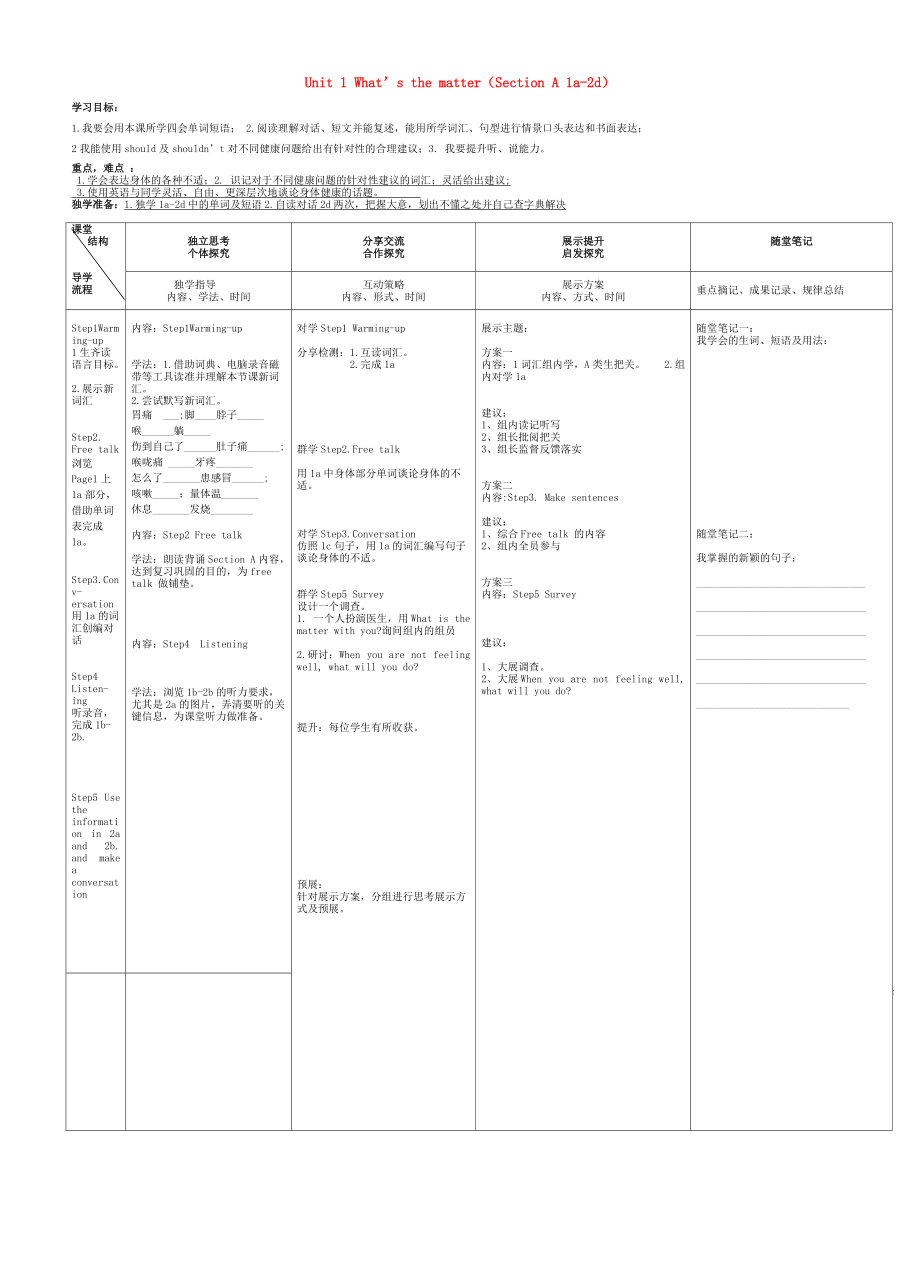《人教版八年級英語下冊 Unit 1 What’s the matterSection A 1a2d導(dǎo)學(xué)案》由會員分享�����,可在線閱讀���,更多相關(guān)《人教版八年級英語下冊 Unit 1 What’s the matterSection A 1a2d導(dǎo)學(xué)案(2頁珍藏版)》請?jiān)谘b配圖網(wǎng)上搜索�����。
1����、 精品資料
Unit 1 What’s the matter(Section A 1a-2d)
學(xué)習(xí)目標(biāo):
1.我要會用本課所學(xué)四會單詞短語�����; 2.閱讀理解對話�����、短文并能復(fù)述����,能用所學(xué)詞匯、句型進(jìn)行情景口頭表達(dá)和書面表達(dá)�����;
2我能使用should及shouldn’t對不同健康問題給出有針對性的合理建議����;3. 我要提升聽����、說能力���。
2�、
重點(diǎn)�,難點(diǎn) :
1.學(xué)會表達(dá)身體的各種不適;2. 識記對于不同健康問題的針對性建議的詞匯����;靈活給出建議;
3.使用英語與同學(xué)靈活、自由�、更深層次地談?wù)撋眢w健康的話題。
獨(dú)學(xué)準(zhǔn)備:1.獨(dú)學(xué)1a-2d中的單詞及短語2.自讀對話2d兩次���,把握大意�,劃出不懂之處并自己查字典解決
課堂
結(jié)構(gòu)
導(dǎo)學(xué)
流程
獨(dú)立思考
個體探究
分享交流
合作探究
展示提升
啟發(fā)探究
隨堂筆記
獨(dú)學(xué)指導(dǎo)
內(nèi)容����、學(xué)法、時間
互動策略
內(nèi)容、
3�����、形式��、時間
展示方案
內(nèi)容�����、方式��、時間
重點(diǎn)摘記����、成果記錄�����、規(guī)律總結(jié)
Step1Warming-up
1生齊讀語言目標(biāo)��。
2.展示新詞匯
Step2.
Free talk
瀏覽Page1上1a部分����,借助單詞表完成1a。
Step3.Conv-ersation
用1a的詞匯創(chuàng)編對話
Step4 Listen-ing
聽錄音,完成1b-2b.
Step5 Use the information in 2a and 2b. and make a conversation
內(nèi)容:Step1Wa
4��、rming-up
學(xué)法:1.借助詞典�、電腦錄音磁帶等工具讀準(zhǔn)并理解本節(jié)課新詞匯。
2.嘗試默寫新詞匯�。
胃痛??___;腳____脖子_____
喉______躺_____
傷到自己了______肚子痛______;
喉嚨痛 _____牙疼_______
怎么了_______患感冒______;
咳嗽_____;量體溫_______
休息_______發(fā)燒________
內(nèi)容:Step2 Free talk
學(xué)法:朗讀背誦Section A內(nèi)容��,達(dá)到復(fù)習(xí)鞏固的目的�,為free talk 做鋪墊。
內(nèi)容:Step4 Listenin
5��、g
學(xué)法:瀏覽1b-2b的聽力要求�����,尤其是2a的圖片����,弄清要聽的關(guān)鍵信息,為課堂聽力做準(zhǔn)備���。
對學(xué)Step1 Warming-up
分享檢測:1.互讀詞匯�����。
2.完成1a
群學(xué)Step2.Free talk
用1a中身體部分單詞談?wù)撋眢w的不適�����。
對學(xué)Step3.Conversation
仿照1c句子����,用1a的詞匯編寫句子
談?wù)撋眢w的不適��。
群學(xué)Step5 Survey
設(shè)計(jì)一個調(diào)查����。
1. 一個人扮演醫(yī)生,用What is the m
6�����、atter with you?詢問組內(nèi)的組員
2.研討:When you are not feeling well, what will you do?
提升:每位學(xué)生有所收獲���。
預(yù)展:
針對展示方案�����,分組進(jìn)行思考展示方式及預(yù)展�����。
展示主題:
方案一
內(nèi)容:1詞匯組內(nèi)學(xué)�,A類生把關(guān)。 2.組內(nèi)對學(xué)1a
建議:
1��、組內(nèi)讀記聽寫
2�、組長批閱把關(guān)
3、組長監(jiān)督反饋落實(shí)
方案二
內(nèi)容:Step3. Make sentences
建議:
1�、綜合Free
7、 talk 的內(nèi)容
2��、組內(nèi)全員參與
方案三
內(nèi)容:Step5 Survey
建議:
1��、大展調(diào)查���。
2����、大展When you are not feeling well, what will you do?
隨堂筆記一:
我學(xué)會的生詞����、短語及用法:
隨堂筆記二:
我掌握的新穎的句子:
________________________________
________________________________
___________
8、_____________________
________________________________
________________________________
_____________________________
等
當(dāng)堂測評 分層達(dá)標(biāo)
一.自主學(xué)習(xí):
1.完成下列短語翻譯���。
發(fā)燒_____________; 躺下
9����、休息 ______________; 喝大量的水_____________;看牙醫(yī) __________; 加蜂蜜的熱茶___________ ;看牙醫(yī)/醫(yī)生 ;
拍x光片____________; 患咳嗽的病_____________;傷到自己_____________;量體溫__________;敷上藥_____________;嗓子疼_______________;
二.根據(jù)首字母提示和句意提示填空����。
1. I have a toothache, I have to see a d______.
2. She is tired, she should g
10、o to bed early, she s______ go to the party.
3. When you have a headache, please lie down and r______.
4. I have a t____ __, so I want to see a dentist.
5.–I have a stomachache .- You shouldn’t eat a______ .
6. Open your m______ and say “AH” .
7. It’s a good habit to brush your t ______twice
11��、a day .
三����、用所給單詞的適當(dāng)形式填空�。
1. I’m feeling terrible, I have a _______ (stomach).
2.You should ______ (drink) enough water every day. Our body needs much water.
3.I think everyone has two________(foot)
4.When you have a stomachache, you shouldn’t eat ____________(something).
四.根據(jù)漢語提示,完成句子���,每空一詞
12��、
1.你怎么了���?我喉嚨痛。
一What’s the ___ with you����?一I have a ____throat.
2.我喜歡喝熱蜂蜜茶���。
I like ________ hot tea ________ honey.
3.你需要間歇性的遠(yuǎn)離電腦。
You ________________________________ .
4.那聽起來像是一個好主意���。
_____________________________________ .
5.你應(yīng)該躺下休息��。
You ________ lie down and ________.
6.我應(yīng)該量體溫嗎�����? Should I
13��、_____ ____ ________________?
7. 我頭疼��。 I have ___ ________________.
8�����、你周末做什么了? What_____ you_____ on the _________?
9�、你應(yīng)該離開電腦休息一下�����。You need to _____ ________ ______ _______the computer.
10.我認(rèn)為你應(yīng)該躺下來休息。I think you should ______ ______ and rest.
五.根據(jù)首字母提示完成表示身體部位的單詞
I’m a robot(機(jī)器人).I have a h___
14����、____, but there is no h______ on my head .I can see with my e_____. I can smell(聞)with my n________. I have a m_________, but there aren’t any t_______ in it because I never eat anything. I have two e_______, so I can hear everything. My n_____ is very short , I can’t turn my head. I have a strong body, but I don’t have a_______ or h_______. I don’t have l_______ or f________, either. So I can’t walk.
課后反饋:
 人教版八年級英語下冊 Unit 1 What’s the matterSection A 1a2d導(dǎo)學(xué)案
人教版八年級英語下冊 Unit 1 What’s the matterSection A 1a2d導(dǎo)學(xué)案

